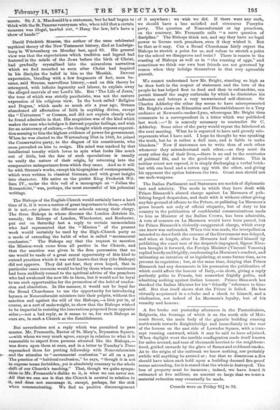We cannot understand how Mr. Bright, standing so high as
he does both in the respect of statesmen and the love of the people he has helped first to feed and then to enfranchise, can permit himself the angry outbreaks by which he diminishes his influence and betrays a very unwarranted self-distrust. Sir Charles Adderley the other day seems to have misrepresented Mr. Bright's views on Education and Disestablishment to a Tory audience at Newcastle-under-Lyne, whereupon Mr. Bright thus comments to a correspondent in a letter which was published last week :—" It is scarcely necessary to contradict Sir C. Adderley. Some other of the party would repeat the falsehood at the next meeting. What he is reported to have said grossly mis- represents what I have said. I hope he thought he was speaking the truth, but he is rather a dull man, and is liable to make blunders." Now if statesmen are to write thus of each other whenever they misunderstand each other,—as they must do every other day of their lives,—there is an end to the courtesies of political life, and to the good-temper of debate. This is neither retort nor reproof, it is simply discharging a verbal brick- bat with one hand and a rotten egg with the other, and giving his opponent the option between the two. Great men should not use mob-weapons.


































 Previous page
Previous page